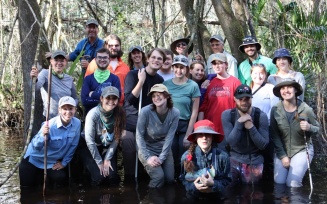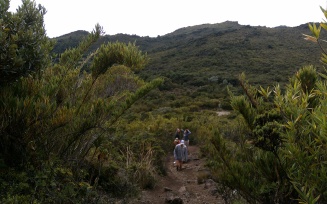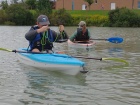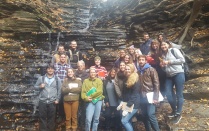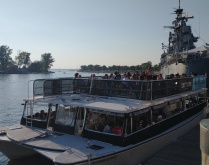Experiential Learning Opportunities
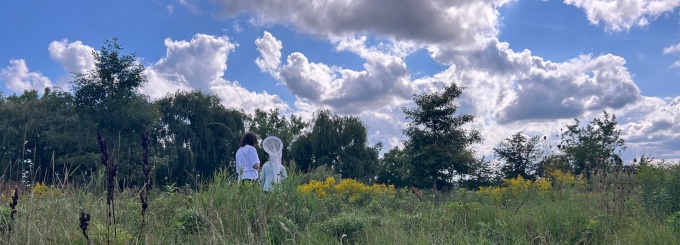
Ecological Methods class collecting monarch butterflies. Photo courtesy Danielle Dolan.
Turn Your Passion Into Action: Internships and Experiential Learning
At Department of Environment and Sustainability (EVS), we believe your classroom should extend into forests, fields, farms, wetlands and beyond. That’s why every degree we offer is built around real-world experiences. Whether you’re tracking wildlife, studying climate policy or growing urban gardens, you’ll gain practical skills while finding your place in this vast and dynamic field.
Learn about:
Exploring internships and research is key to discovering your unique path in environmental work—what we like to call your JAM. That’s why we require every student in EVS take on at least one internship before graduation. It’s your chance to apply what you’ve learned in class, build your network, and uncover what truly excites you about the environmental and sustainability world.
Your world of experience starts here
EVS students have access to a wide range of hands-on learning opportunities:
- Environmental Internships (EVS 496)
- Research with faculty
- Field-based expedition courses like EVS 493
- Global opportunities through Study Abroad
Whether you're in Environmental Studies, Environmental Science, or Environmental Sustainability, our advisors can help you work these experiences into your plan of study—and make the most of them.
EVS 493 Ecology of Unique Environments.
Everglades, FL
EVS 493 Ecology of Unique Environments.
Costa Rica
Details:
- 3 credit hours
- 120 hours total (about 8–10 hours/week)
- Offered in fall, spring, and summer (tuition required in summer)
- Must be arranged in advance with our Internship Coordinator, Professor Sanford (Sandy) Geffner
Many students have turned these internships into part-time or full-time jobs. We work with more than 85 local, regional and national partners, and over one-third have hired UB students directly.
Sample Internship Placements
- NYS Department of Environmental Conservation
- US Army Corps of Engineers
- US Fish and Wildlife Service
- NYS Office of Parks and Recreation
- SPCA Wildlife Division
- NYS Attorney General's Office
- Buffalo Niagara Waterkeepers
- Lake Erie Watershed Protection Alliance
- Erie County Department of Environment and Planning
- WNY Land Conservancy
- Reinstein Woods Nature Preserve
- Tifft Nature Preserve
- Buffalo Zoo
- Beaver Meadow Nature Center
- Earth Spirit Educational Services, Inc.
- WNY Sustainable Business Roundtable
- UB Sustainability Office
- Let's Goat Buffalo
- The English Gardener
- Groundwork Market Garden
You can complete more than one internship during your time at UB, but only one will count toward your major requirement.
Many of our courses incorporate experiential learning:
EVS 310 Ecological Methods students visited the Niagara Falls and conducted Monarch butterfly tagging.
EVS 452/552 Limnology students collecting water quality samples in Lake LaSalle, University at Buffalo.
EVS 311 Sustainability Methods students visited Farmer Pirates to learn about food composting methods and operations of Farmer Pirates.
EVS 310 Ecological Methods students learning about leaf litter associated invertebrates.
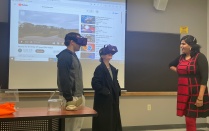
EVS 199 Weather and Climate students learning about traveling into space through Virtual Reality. Students experienced temperature and altitude changes while traveling into the upper atmosphere.
EVS 315 Field Ecology students visited Shale Creek to learn about forest ecology.
EVS students took a historical tour along the Buffalo River and out into the Buffalo outer harbor. Students also learned about the ecology and restoration of these waterbodies. EVS 310 Ecological Methods, EVS 199 UB Seminar, EVS 489: Special Topics:Urban Ecology and EVS 454/552 Limnology.
Make your next move. Talk to your department advisor and your academic advisor to explore how internships, research, or study abroad can power up your degree and shape your future.
Stories that inspire.
Want to know what it’s really like to learn by doing? Check out how students just like you are gaining hands-on experience, discovering their passions and making an impact—in Buffalo and beyond.
⬇️ Read their stories. Picture your path.

Jaxon Philips '26
environmental Geosciences
Walker Family Experiential Learning Fund
The whole point of going through higher education and partaking in extracurriculars is to learn more about your craft and yourself as you build from those experiences, something that never truly ends.
- Jaxon Phillips
Q: You recently interned for SUNY Climate Corp as a watercraft steward. What did a typical day look like?
A: Every morning I would set up an informational booth at one of the two boat launches I was assigned to. Throughout the day, boaters, anglers, and recreational groups would come to put their watercraft into Oak Orchard Creek. Before they launched, I would interview them on things like where they launched their boat last, whether they had cleaned it between uses, if they were aware of the effects of invasive species, and other related questions. I would also frequently answer any questions visitors had about the park and about invasive species and would conduct species identification rake tosses to monitor the relative abundance of plant species within the creek. At the end of the day, I would pack up all my memorabilia and submit the surveys I had conducted to my supervisors.
Q: How did your experience relate to your major?
A: Aside from major-specific coursework and elective classes, my internship with SUNY ESF taught me a lot about public communication, species identification, site survey management, and public survey conduction. Overall, it was an experience that gave me a solid skillset in invasive species management and site assessment that absolutely aligns with my major at UB.
Q: Did the internship influence your future career decision?
A: My internship provided the groundwork for a potential future career in environmental site assessment and public communication. Being able to understand and replicate common data collection practices such as species identification and public surveys are undoubtedly useful tools for monitoring an environmental site or really any career that requires data collection and analysis. Furthermore, more general skills like managing an informational booth, informing visitors on park policies, and manual labor are applicable to a wide variety of jobs, including the ones I am looking to peruse post-graduation.

Aubrey Monaco '25
ENVIROMENTAL GEOSCIENCES BA
Paul and Christine Nussbaum Experiential Learning Innovation Fund
Don't be afraid or apathetic about attending events, getting involved and talking with people. I think it is really important to build a support system especially in a place where we spend so much of our time.
- Aubrey Monaco
Q: Tell me more about your experiential learning that you got to do with your funding?
A: With my experiential learning fund, I was able to participate in an internship with the Buffalo Zoo. This was an internship in the Buffalo Zoo Education Department where I was a seasonal education assistant. With this position, I worked at the zoo's Goat Island and Heritage Farm and I also worked with the education ambassador animals. This position allowed me to learn about animal handling with multiple different animals, including reptiles, mammals, insects and amphibians. I also got to help our guests learn about the animals at the zoo.
Q: What was your favorite part about it?
A: My favorite part of this experience was being able to work with so many different animals and I feel that I formed lasting connections with them. It was also great to help guests, especially children, learn something new and watch them become excited about our animals.
Q: How is it helping you with your studies?
A: I am very passionate about environmental conservation and restoration, especially in the face of climate change. This experience helped me see another route of conserving our environment. Though I am still not a total fan of zoos, the Buffalo Zoo did help show me how and why it is important to preserve species that are endangered and at a risk of becoming extinct. I now feel that I have a fuller understanding of what it means to practice conservation and I feel that this information will greatly help me in my studies. Specifically, I am now able to think of alternative solutions to conservation outside of something such as a nature preserve because of this experience.
Q: What do you want to do after graduation? How do you plan to make an impact on the world?
A: After graduation, I hope to find a job with a park or nature preserve in New York. I also hope to attend graduate school at UB in the evolution, ecology and behavior program specifically pursuing the ecology track. With this, I want to be able to grow my research skills so that I can pursue research in the long-term.
I hope to research symbiotic relationships and how these are affected by anthropogenic climate change and with this how these relationships can possibly be used to mitigate this climate change. The rising temperatures and extreme weather events caused by anthropogenic climate change are threatening many different ecosystems and therefore threatening humans. I hope to help find a path to slow down the effects of climate change.
